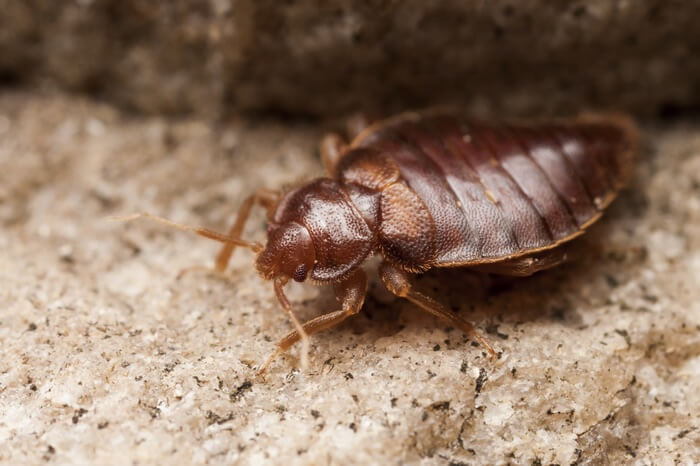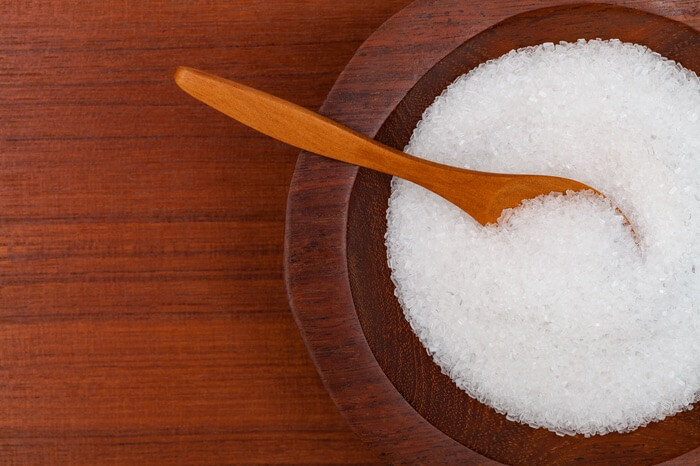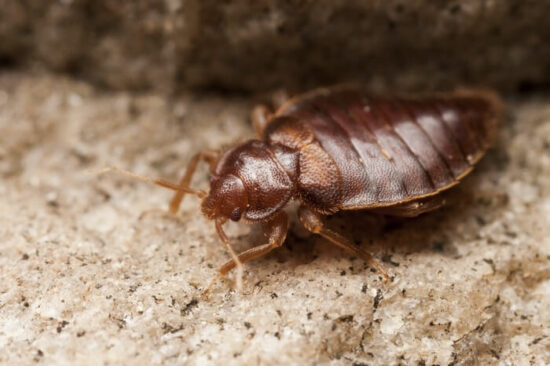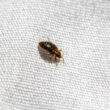Many homeowners want to know if killing bed bugs with salt is a viable strategy. After all, it can be used to deal with other pests and it’s readily available!
This guide will teach you if salt can kill bed bugs, and some potential combinations that are commonly used.
Table of contents
Can Salt Kill Bed Bugs?
Salt is a catch-all remedy that many homeowners utilize in their battle against pests.
While it does work against soft-skin mollusks like snails and slugs, it doesn’t work against hard-shelled insects. That means salt cannot kill bed bugs.
- Kill bed bugs and bed bug eggs
- Use spray as a spot treatment around bed frames, mattress seams/tufts/folds, and baseboards
- Kills even the toughest bed bugs
- The continuous spray Comfort Wand easily gets into hard-to-reach areas
Despite the many old wives’ tales saying that you can kill bed bugs with salt, there’s no scientific evidence to suggest that it has any impact on the bloodsucking insect’s health whatsoever. In fact, basic bed bug biology asserts that these creatures have natural protection against the effects of salt (more on that later).
Why?
Ask any gardener to show you their pest-fighting arsenal, and you’ll likely see salt somewhere in the mix. Salt is a basic mineral that’s cheap and super easy to source. Not only that, but it works exceptionally well against leaf-eating snails and slugs.
You see, salt is a super absorbent mineral. It’s not just used to add some flavor to your favorite dish! Throughout history, salt has been the go-to for long-term preservation and dehydration, too.
Without getting too deep into the scientific details, salt is an ionic compound with attractive forces to polar water molecules. So, it pulls any water in both liquid and vapor form.
What does that have to do with killing snails and slugs?

Well, salt uses the process of osmosis to slay mollusks. These pests have thin skin that acts more like a permeable membrane. Their delicate skin lets them easily transfer fluids in and out of their body to stay healthy.
The moment you douse a slug or snail in salt, the mineral gets to work drawing those fluids out of the body. In a matter of minutes, the salt will fully dehydrate the mollusk and kill them!
It’s a fascinating process that works with the biology of the snail or slug.
Unfortunately, bed bugs don’t utilize the same biological processes to transfer liquids. They’re entirely different creatures with distinct physical properties, which makes killing bed bugs with salt ineffective.
Bed bugs are hard-shelled. They have a tough exoskeleton that only gets more durable with time. As nymphs, bed bugs will shed their old skin several times before adopting their adult form. After that, the shell becomes more resilient as the bug feeds.
The exoskeleton protects the internal organs. It’s not permeable and cannot transfer fluids like the soft skin of a slug.
Quick Tip: There are some fluids on a bed bug’s body. They take the form of a waxy protective layer. However, salt is not enough to remove those waxy lipids. Interestingly enough, the wax prevents salt from sticking to the bug’s body entirely.
In other words, killing bed bugs with salt won’t work (unless you combine salt with other more effective methods). It doesn’t absorb into the skin or impact hydration levels whatsoever.
Other Combinations People Try
While killing bed bugs with salt alone isn’t a good idea, there are plenty of other combinations that homeowners try. Most of these are very DIY-friendly as well.
With that being said, some are more effective than others. Let’s take a closer look at some of the most prevalent methods to use salt when killing bed bugs.
Saltwater
If dry salt doesn’t work, what about saltwater?
The principles here are the same. Saltwater is supposed to dehydrate bed bugs and slowly kill them. You might hear people talking about saturated mattresses and sheets in salty water to get results.
Sadly, saltwater has just as much efficiency as dry table salt! The sodium within the water isn’t enough to dissolve through the waxy lipid layer or hard exoskeleton. You can spray all you want, but it’s not going to do much to get rid of the insects.
Technically speaking, you can kill bed bugs with saltwater through drowning. But, that would involve collecting the insects and submerging them for several days since bed bugs can survive in water for quite a while. That’s a pretty impractical method of extermination.
Collecting the bed bugs individually isn’t going to do much to decrease the pest population. Plus, these insects are capable of surviving underwater for about 24 hours, so you’d have to keep them submerged for at least a full day.
Furthermore, there’s no difference between using saltwater and freshwater for drowning. It’s the water itself and not the salt content that’s killing the bugs.
Quick Tip: All of that said, you can still get some use out of saltwater when dealing with a bed bug infestation. The salty solution will not kill the bugs directly, but it can help with bite treatment. Saltwater has antiseptic properties that can effectively reduce itchiness once the inflammation goes away.
Salt & Baking Soda
Baking soda is another common household ingredient that people try to use when dealing with bed bugs. You might see folks mixing it with salt to improve the efficiency of both products.
On paper, that sounds like a good idea. The powder is very versatile and has widespread use in many products. It’s in everything from cleaning products to toothpaste.
A gentle abrasive, baking soda works wonders to scrub surfaces clean without any damage. So, why not use it against bed bugs?
In theory, baking soda and salt seems like an effective tool to have in your arsenal. But in practice, it doesn’t do much at all!
The texture of baking soda isn’t right. While it has some light abrasive qualities to it, the powder isn’t enough to cut through that tough exoskeleton. As a result, baking soda is nothing more than an annoyance to bed bugs.
It does nothing to help your efforts to kill the bed bugs in your home.
Borax & Salt
Next up, we have borax. If you’re a fan of DIY-friendly pest control methods, you’ve likely heard of borax before.
Also known as sodium borate, borax is a boron compound that comes in a white powdery form. Like baking soda, it’s used in a wide range of household products. The most common are laundry detergents, but you’ll see it in everything from cosmetics to slime toys!
Using borax is one of the oldest tricks in the book for dealing with household pests. It does a fantastic job of slowly poisoning insects like ants and roaches. But does borax kill bed bugs?
To understand how borax and salt affects bed bugs, you have to learn about its role in pest control as a whole. With those other insects, borax acts as a slow-acting poison.
DIY pest control methods involve mixing borax with a typical bait food. That could be something as simple powdered sugar or peanut butter. Several hours after eating the food, the insect will slowly succumb to its effects.
By that point, it’s had time to bring the borax to the bed bug nest and poison other members of the colony. It’s a great way to treat massive ant or roach colonies.
But if you know anything about how bed bugs live, it’s obvious that borax is ineffective against them. To have an impact on the insect’s health, they have to consume it. Bed bugs exclusively feed on blood, so baiting them with food is not an option.
Now, you might experience limited success mixing borax with saltwater. But, the results are hit and miss.
Quick Tip: The best you can hope for using a borax and saltwater solution is to drown the insects, eliminate scent trails, or encourage accidental inhalation. The bugs could inhale the borax vapors, which might have some effect. However, borax isn’t going to do much to take care of the bed bug infestation at large.
Diatomaceous Earth & Salt
Diatomaceous earth is, perhaps, one of the more effective DIY-friendly pest control methods out there. Like borax and salt, using this stuff stems from old-school methods passed down through generations. However, unlike some of the previous extermination methods we discussed, this one has some firepower behind it!
Diatomaceous earth is a powdery substance that’s readily available at most garden centers. Gardeners use it all the time to take care of pest insects that damage crops.
It’s made out of the fossilized remains of aquatic organisms called diatoms. The diatoms have skeletons made of silica, so grinding them up results in high abrasion on a molecular level.
Like salt on slugs, applying diatomaceous earth on insects leads to dehydration. The powder creates tiny tiny cuts all over the bug’s body, paving the way for fluids to drain out as they die slowly.
The main difference between salt and diatomaceous earth is its effectiveness against hard-shelled insects like bed bugs. Salt isn’t abrasive or acidic enough to cut through those exoskeletons. Diatomaceous earth, however, is abrasive enough to get the job done!
It’s very effective when it comes to killing bed bugs.
Quick Tip: If you were thinking about killing bed bugs with salt this might be the best method for you due to the similarities of how you would distribute it.
You can apply it to affected areas (with or without salt). However, most agree that the best course of action is to spread the powder onto cracks, crevices, and hiding spaces. All you need is for the bugs to walk through the powder.
Spreading it in open spaces like your bed usually provides limited results because the bed bugs will avoid it. But when you apply it to all those tiny nooks and crannies where the bugs hide, they have no choice but to expose themselves to the powder.
Apply diatomaceous earth frequently to take out as many bed bugs as possible.
Is Epsom Salt Any Different?
We know that standard table salt doesn’t do much to kill bed bugs. But what about Epsom salt?

Also known as magnesium sulfate, Epsom salt has many purposes. It’s used in industrial and agricultural applications. You can also see it in spas as an exfoliant or water treatment for muscle soreness.
Unfortunately, Epsom salt is just as effective as common table salt. No amount of this salt will kill bed bugs. Even if you mix it with borax or water, it will have virtually no impact on these bloodsuckers.
Conclusion
While killing bed bugs with salt isn’t a great option, there are many other methods you can try that will work quite well! Just head over to the bed bug section of our site and find one that works for you.



